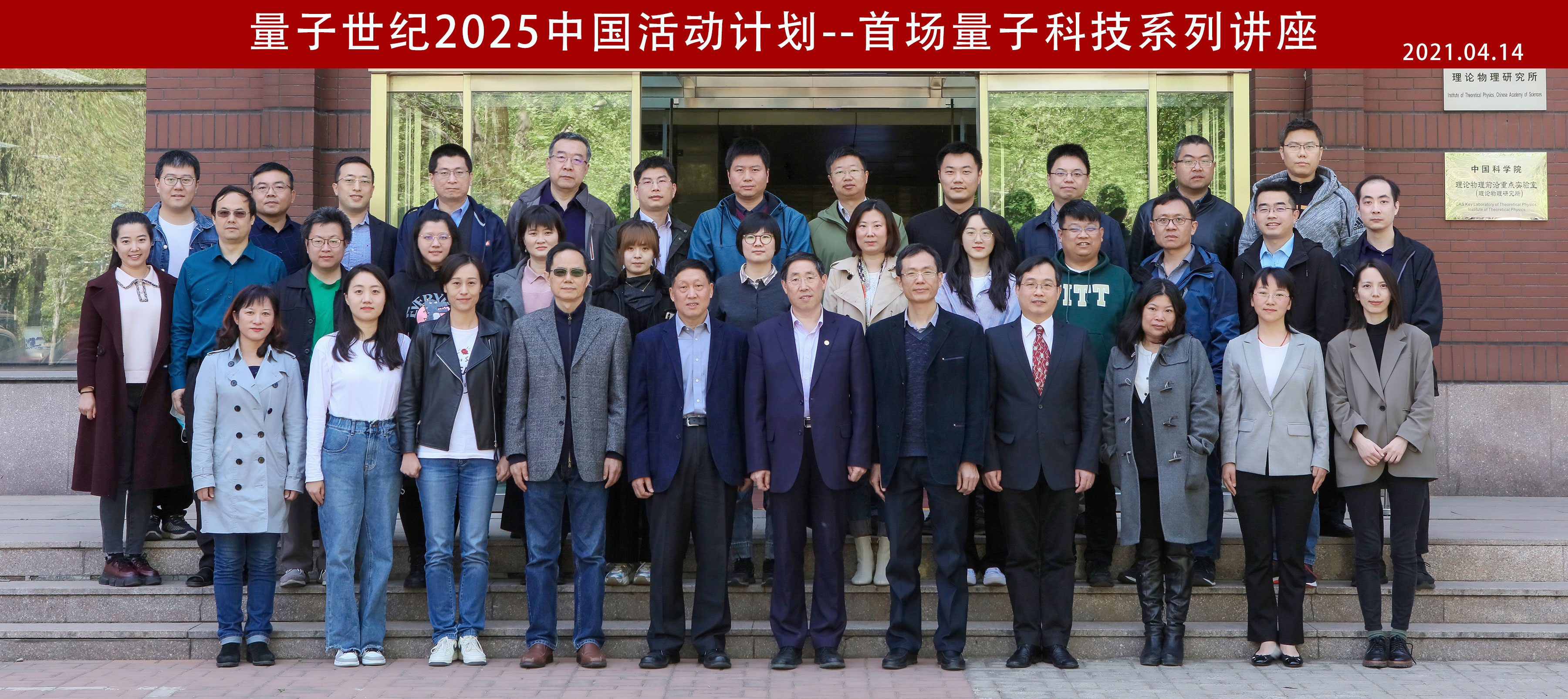On April 14, 2021, Quantum Century (2025) China Plan and the first series of lectures on quantum science and technology were successfully held in Beijing. The event was jointly organized by ICTP-AP, the Institute of Theoretical Physics (ITP), the Institute for the History of Natural Sciences (IHNS) and Youth Innovation Promotion Association of CAS. As the kick-off conferenceof “Quantum Century (2025)” in China, this event was broadcast live by KouShare Academic Platform online and offline, attracting more than 2,700 active participants.

Academician Yueliang Wu , Vice President of University of Chinese Academy of Sciences (UCAS) and Director of ICTP-AP gave a themed lecture of “Meeting the New Quantum Century and Igniting the New Scientific Revolution”. Wu Yueliang first reviewed the centennial history of quantum theory, then introduced the scientific and technological progress brought by the development of quantum theory, and looked forward to the scientific and technological revolution of quantum in the new century. Finally, he briefly introduced his recent work on “The basics of hyperunified field theory”.
Shenghua Hu , deputy editor-in-chief of Science Press and Director of publishing centre,Baichun Zhang , researcher at IHNS and academician of the International Academy of the History of Science jointly gave a themed lecture on “Wang Shoujing and Early Quantum Mechanics Research”, which mainly introduced the contributions made by Wang Shoujing and his research to the development of quantum mechanics. They also briefly summarized the theoretical physics situation in the United States before and after the birth of quantum mechanics and the observation on China’s early development of physics.

(left to right:Yueliang Wu,Shenghua Hu,Baichun Zhang)
Shangui Zhou , deputy director of ITP, and Xiaowu Guan , deputy director of IHNS attended the kick-off conferenceand delivered speeches. Jinyan Liu, associate researcher at IHNS introduced the origin of “Quantum Century 2025” and proposed more experts and scholars to participate together.

(left to right :Shangui Zhou,Xiaowu Guan,Jinyan Liu)
In the 20th century, people knew about the micro-world based on quantum mechanics and developed a series of important scientific and technological achievements. The new century of quantum is coming, and there are still many unknowns about quantum. We expect more young scholars to join in relevant research, driving a new round of scientific and technological revolution and industrial transformation, and promote major scientific and technological innovation.
Background Introduction of Quantum Century 2025
At the end of the 19th century, physicists gradually realized that classical physics could not explain all the phenomena in the microscopic world reasonably, and began to explore new theories. In 1900, Max Planck first put forward the concept of “quantum”. By the mid-1920s, physicists gradually constructed the core theory of quantum mechanics. In 1925, Heisenberg, Born and Jordan cooperated to develop the matrix mechanics form of quantum mechanics. In 1926, Schrodinger developed the wave mechanics form of quantum mechanics and proved its equivalence with matrix mechanics. The establishment of quantum mechanics has broken the barriers of classical physics, reshaped people's cognition of science and the world, and stimulated a series of major changes in science and technology.
“Quantum Century (2025)” was initiated by American Physical Society in 2020. It aims to review the interaction among theory, experiment, technology and culture in the development of quantum mechanics in the past centuryLooking forward to the development of quantum materials, quantum computing and other technologies in the next century, so as to deepen the public's understanding of quantum mechanics. Similar to the International Year of Physics in 2005 and the International Year of Light and Light-based Technologies in 2015, UNESCO is planning to designate 2025 as the International Quantum Year. At present, research institutions and universities from many countries and regions, such as European Physical Society, European Organization for Nuclear Research, Max Planck Society of Germany, International Centre for Theoretical Physics of Italy, Bohr Archives of Denmark, Joint Institute of Nuclear Research of Russia, Physical Societies of Korea and India have participated in this activity.
According to the reduced Planck constant h=4. 13566 × 10 (-15) eV∙s, international physicists suggest that April 14th be designated as the celebration day from 2021. By launching quantum themed activities all over the world, we can review the centennial history of quantum science and look forward to its development in the next century, so as to deepen the public's understanding of quantum science.
【相关报道】
科学网:http://news.sciencenet.cn/htmlnews/2021/4/456016.shtm




.jpg?x-oss-process=style/news)
